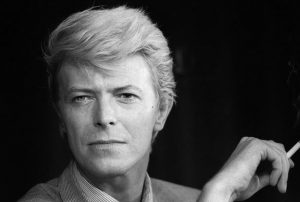 Even in death, David Bowie knows how to steal the show. On Sunday at the Grammy’s, Bowie’s last album, Blackstar, won Best Alternative Music Album, Best Engineered Non-Classic Album, and Best Recording Package. His eerie track, No Plan, won Best Rock Song and the video won Best Rock Performance.
Even in death, David Bowie knows how to steal the show. On Sunday at the Grammy’s, Bowie’s last album, Blackstar, won Best Alternative Music Album, Best Engineered Non-Classic Album, and Best Recording Package. His eerie track, No Plan, won Best Rock Song and the video won Best Rock Performance.
There are only a handful of rock stars that achieve iconic status as Bowie did. Bowie artfully tested the boundaries of music, fame and even gender, opening our eyes and hearts to wider possibilities in life, art and song. His hits, “Young Americans,” “Changes” and “Heroes” are anthems for the Boomer generation. From a late ’70s perspective, they echo (in my mind, at least) through the halls of my former high school, in homes at the after football-game parties we attended on Fridays and Saturdays, and on the radios we listened to in the Mustangs, Dodge Chargers and Camaros we drove.
Many critics felt his last album was among his best. In a 2015 Rolling Stone preview for the album before his death (or any public knowledge about his illness), Bowie was described as a genre-breaker, an artist who makes (not breaks) the mold as others follow to imitate his art. Since his passing, it’s easy to pick out the many references in the album to death and mortality, a man embracing his own mortality with wisdom, grace and a little dark humor. Bowie’s ability to make the strange seem extraordinary is just one of the reason’s his art has endured for half a century. Adventurous to the end, Bowie’s legacy and unconventional approach to crafting his music offers important lessons about success:
1) Be audacious: From his first breakthrough album, Ziggy Stardust and the Spiders From Mars, Bowie was not afraid to turn the notion of what it means to be a rock star on its head. The 1972 album fused British Mod with Japanese kabuki styles (recalls Billboard’s Mike Barnes) and starred the flamboyant, androgynous alter ego Ziggy Stardust.
Here is how rock critic Robert Christgau described the performance: “Bowie’s actorly intonations add humor and shades of meaning to the words, which are often witty and rarely precious, offering an unusually candid and detailed vantage on the rock star’s world.” Bowie was known to be a musical chameleon who invented and reinvented his musical style and stage act again and again, giving his fans unique takes and a fresh perspective on the world every time. He understood how to “package” his musical persona in a way that no one had ever done to make his way in the music world, a talent not lost on musicians Madonna, Lady Gaga and others ever since.
Lessons: Be willing to take bold risks in your career and business dealings. Some ideas will succeed, others will fail, but much can be learned in the doing. As Bowie proved, sometimes the unconventional trumps the status quo and leads to game-changing ideas that have a profound impact on us all.
2) Be charismatic: While Bowie had his critics, he inspired devotion in his fans and respect from many of his detractors. This is because he had vision, he was true to himself and he remained authentic throughout his career even while trying on different personas. He knew how to tap into the emotions of his fans to relate on a personal level, while giving us some of the best music and film performances of our time.
Lessons: Follow your passion with purpose and intent. This creates a strong energy that others respond to. Communicate your vision in a way that motivates and inspires trust. Nikki Owen, international speaker and founder of The Charisma Model, says many of these traits can be learned. A good place to start is to take a close look at your energy and body language to make sure you are projecting confidence to others.
3) Be versatile: Even in his early school years in Brixton, London, Bowie was recognized for his vividly artistic dance, vocals and a flair for instruments. It was there he learned the ukulele, tea chest bass and piano, followed by saxophone lessons in later years.
Throughout his career Bowie’s musical styles varied wildly, sometimes folk-inspired, other times raucous rock or eclectic techno-pop. He was also a fashion trailblazer with an instinctive grasp of the power of image; his costumes were as much a part of his performances as his music. As reported on Yahoo!News, the 2013 “David Bowie Is” retrospective at the Victoria and Albert Museum in London displayed his most iconic outfits and his popularity as a multimedia artist. It was the museum’s fastest-selling show of all time.
From his Glam Rock and New Romantic periods to his final jazz release, Blackstar, Bowie refused to be pigeon-holed.
Lessons: Take time to learn new skills and pursue emerging fields of endeavor. Pay attention to where your profession is going, how your talents align or don’t, then work on developing new competencies that take you where you want to go.
4) Be collaborative: From taking the young band, Arcade Fire, along to “perform in a few shows” in 2005 to hits like “Under Pressure” (written with Queen’s Freddie Mercury), David Bowie was generous in lending his talents to others. He produced Lou Reed’s album Transformer, spawning the hit, “Walk on the Wild Side,” as well as numerous albums for Iggy and The Stooges. He formed the alternative band, Tin Machine, in 1988 with Hunt and Tony Sales (sons of comedian Soupy Sales). And of course anyone over the age of 50 remembers the famous collaboration with Bing Crosby, when Bowie performed the Christmas tune, “The Little Drummer Boy” on a TV holiday special.
Hit or miss, Bowie understood that experimentation with music styles, genres, artists and influences only made the music better.
Lessons: Tap into the unique talents of peers and mentors and don’t be afraid to lend your expertise to others. This selfless act does more than build strong relationships. It leads to fresh ideas, new approaches to problem solving and business innovation.
“I don’t know where I’m going from here, but I promise it won’t be boring.” David Bowie

Because David Bowie kept the depth of his illness under wraps for most of the last 18 months of his life, some (including Stephen Marche of Esquire) are speculating that he intended to make his death a musical event by releasing his last album, Blackstar, on his birthday, Jan. 8, just two days before his passing. According to Marche, producer Tony Visconti has confirmed he made the record as a “parting gift” for his fans and wanted his death to be a “work of art.” In a moving tribute, he adds, “Bowie performed with the joy of a man escaping a dying world. It was David Bowie’s world. We’re just living in it.”
May Bowie’s lessons on success and his extraordinary talent be the gift that keeps on giving.
The views expressed here are mine and mine alone. They do not necessarily reflect the opinions of my current or former employers, my friends and colleagues, anyone I may have met in the past or may meet i the future.
